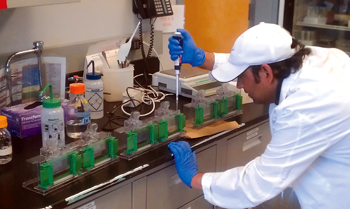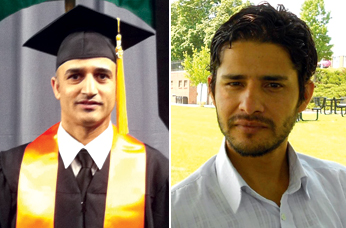Bhutanese refugees in the US are determined to carve out a better life on foreign soil

Dal Bahadur Khatri
After Bhutan evicted 100,000 its Nepali speaking population in the early 1990s, the
refugees settled in camps in eastern Nepal. Countless negotiations between Bhutan and Nepal only resulted in failure.
Finally in 2008 eight countries agreed to take in the displaced Lhotsampas. More than 71,000 refugees have been resettled, nearly 90 per cent of them in the United States as of September last year.
Another 35,000 are waiting for their turn to find a permanent home.
Dal Bahadur Khatri is among the thousands who fled to Nepal two decades ago. After living in tiny shacks at the overcrowded camps in Jhapa, Khatri was relieved when he learnt he would be moving to the US.
“I can finally lead a safe and secure life and that’s something I had never experienced before,” says an emotional Khatri. Today he is preparing for a PhD in neuroscience at the North Carolina Central University and aspires to land a federal job. “This land is full of opportunities so I am not scared to dream,” he says.
Many young people like Khatri who were resettled in America have left behind their turbulent past for a fresh start. “I always knew education was the key to success,” says 19-year-old Ganesh Sharma who came to the US in 2009. A hardworking student, Sharma was selected for the highly competitive Gates Millennium scholarship which recieves more than 1,000 applicants each year. The scholarship will cover all his expenses for his four year undergraduate degree in aerospace engineering.

Yug Dawadi, Tej Mishra
The frail bamboo huts with leaky plastic roofs at Khudunabari refugee camps never deterred Yug Dawadi from working hard in school. He supported his education by tutoring local kids. But even for such a bright student life in Nepal was very difficult. He was refused admission at a medical school because he didn’t possess a citizenship card. “The hardships I went through in Nepal inspires me to work harder to achieve my goals,” says Dawadi. His perseverance has finally paid off and he is now pursuing a master’s degree in medical science at Idaho State University. “There are plenty of opportunities awaiting us here,” he adds.
Like Dawadi, Tej Mishra who wanted to study microbiology was refused admission in Nepali colleges for the exact same reason. Mishra is currently completing a master’s degree in public health at Boston University. Looking back at the 18 harsh years he spent in refugee camp, he says life in Massachusetts feels surreal: “It still feels like a dream sometimes.”
While many have given up hopes of returning to Bhutan choosing instead to focus on their lives in America, few like Mishra haven’t forgotten their homeland. Says Mishra: “Even though Nepali-Bhutanese are scattered all over the word, we will not let our voices die out and will continue to speak against the injustices unleashed by Bhutan.”
Read also:
Huddled masses yearning to rejoin families
New home
Read NYT's opinion piece on Bhutan